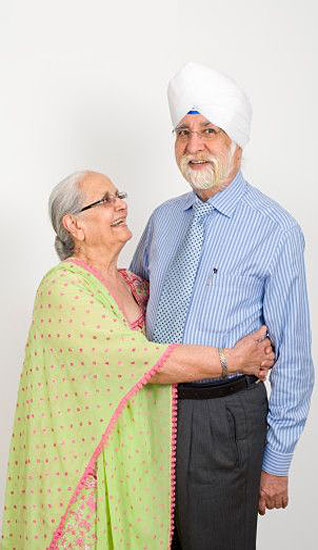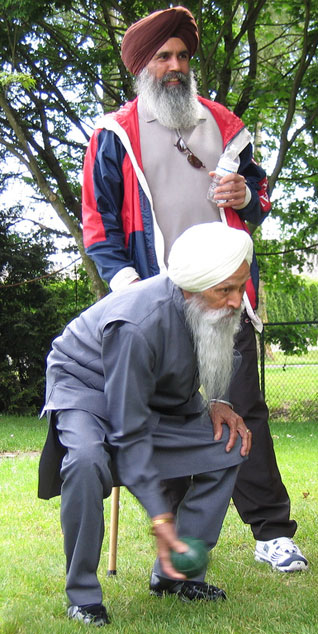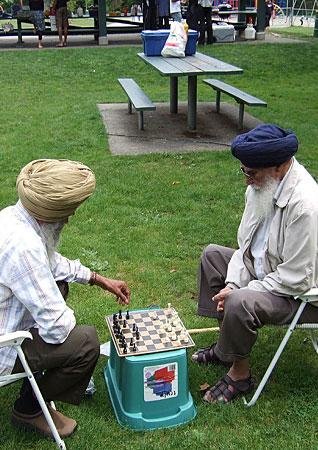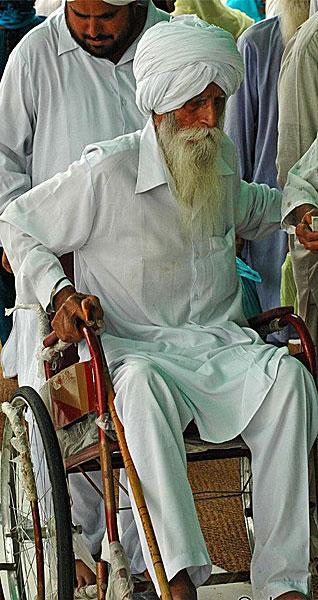
Photos: above - courtesy, Getty Images. Below, first from bottom - courtesy, Shunya. Second & third from bottom - courtesy, Bhupinder Singh & Gurvinder Kaur.

Lawn
Bowling


Current Events
Guru Nanak Niwas:
An Assisted-Care Centre
by ANUPREET SANDHU BHAMRA
EDITOR: We would love to get your feedback, once you've read this piece, on what YOU think is best for our loved and aging seniors. You can post your comment at the bottom of the page. Thank you.
The house would bustle with activity, as Ms. Saroj Sood's three grandchildren got ready for school. She'd make tea and see the youngsters off at the door.
Then she'd get back to the daily household chores. Making lunch - usually a traditional Indian meal - was top priority for the grandmother who managed the house, as her son and daughter-in-law worked.
Afterwards, she'd help the youngest, her only granddaughter, with homework - despite being two generations apart, they shared an interest in craft projects.
Later, as Saroj waited for her son and daughter-in-law to get home, she'd read books on such topics as spirituality, religion and alternative healing. In the evening, the family would try to have dinner together, a tradition that brought each generation to the same table every evening.
But all that changed two years ago, when then 76-year-old Saroj Sood moved into Guru Nanak Niwas, an assisted-care centre in Surrey, British Columbia, Canada.
For what can be called an ordinary event in a typical Canadian home, it was a shocker in the Sood household. The move, for a woman of South Asian heritage, was breaking convention.
And it hurt at least one family member - her young granddaughter. "I didn't want her to go; I was pretty mad, I was like saying to myself that I wasn't going to talk to her and I was, really really mad," says Richa Sood, now 14.
In South Asian culture, children look after their elderly parents in the same home, even if they need assisted medical care; it's considered morally wrong to put parents or grandparents in a care home.
Yet more and more South Asian seniors are moving to seniors' homes and assisted-care centres, says Charan Singh Gill, a Surrey-based community activist.
While no data are available to document a trend, Charan's statement suggests a cultural tradition colliding with economic realities of living in a Western society.
"Husband and wife are working; both are working to pay the mortgage. It's not a matter of choice any more," he says, referring to the growing needs of South Asian seniors, who are often left alone at home with no one to care for them.
Charan campaigned for an assisted-care centre and arranged funding, and in February, 2007, opened what he claims is the first one in North America catering to Sikhs and other South Asians.
That is where Saroj moved.
The tradition of taking care of elderly parents is heavily reflected in the South Asian popular culture as well. Punjabi and Indian movies, songs and soap operas routinely reflect the theme of care and compassion for elderly parents in the same home.
But this was a choice made by Saroj, who has always lived life on her own terms. Widowed at 46, she decided to immigrate to Canada from her home in a small city in northern India. With two teenage sons to look after, she believed Canada would give a single, working mother more opportunities.
She landed in Quebec, where, for nearly a decade, she ran two boutiques - earning money, sending her boys to school and learning the Canadian way of life, which included conversing in French. The family eventually moved to Surrey, where Saroj retired.
Although she stayed with her son's family and was a pivotal part of the household, she knew she had to move on. She talked to friends and secretly looked for a care home.
Then one spring, she got very sick. She was 75 years old and was hospitalized. The extended family cared for her. She says that was the moment when she decided she had to make a change. As soon as she was well enough to return home, she announced her decision. The initial shock and reluctance soon turned into support, and she moved into the Guru Nanak Niwas early in 2007.
She says she is happy with her decision. At the Niwas, she wakes up and has breakfast with the rest of the residents in the dining hall. There are no grandchildren to see off and no lunch preparations to make. Instead, after breakfast, there are light exercises.
After that, it's time to socialize, followed by lunch and then rest. Over dinner, new traditions are built, as Saroj dines with the Centre's residents instead of her own family. There is no one to wait for. She simply walks into the dining hall and takes a seat next to her new friends. The sights and sounds of her grandchildren, the woman-to-woman conversation with her daughter-in-law, are replaced by conversations among friends of the same age group.
"I've left a smaller family and now my family is so big," says Saroj.
Her son understands his mother's need to be with people her own age. He says that when children play with children, teenagers hang out with other teens and adults look for companionship in their own age group, why should we stop our seniors from doing the same?
Sikhs are now one of Canada's largest visible minority groups, at approximately half-a-million, and Guru Nanak Niwas, is named after the founder of Sikhism.
It is open to all faiths.
Surrey-based Progressive Intercultural Community Services Society runs the centre with aid from BC Housing and Fraser Health Authority.
The centre has a predominant Sikh and Punjabi staff who, in addition to English, speak such South Asian languages as Punjabi, Hindi, Bengali, Urdu and Fijian Hindi. Meals and entertainment are planned with a Punjabi flavour, and residents celebrate major Sikh and other South Asian festivals at the centre.
"Stigma is there, but cultural barriers are breaking down very quickly," says Charan Gill of the centre's popularity.
Richa Sood, who now spends some weekends with her grandmother at the centre, has come around.
"In our culture, it's not a very common thing, but I'm really proud that [my grandma is] happy here; that she has made that decision on her own, she has talked to everyone, she has considered everyone's feelings and she is really happy here," she says.
Saroj Sood's suite is a testament to the values she shares with her sons and their families. The living room is full of little keepsakes that have messages of "World's Number One Mom" and "There's no place like home except Grandma's."
Her son says it's time for South Asians to not treat their elderly parents as caretakers of their own kids. And Saroj has a message for the other elderly in the community:
"They should get out from the homes and have their own lives. This is our life and this is how we should live, according to our taste, according to our style."
[Courtesy: The Globe & Mail. The article has been edited from its original version.]
May 29, 2009
Conversation about this article
1: Balkar Singh (New Jersey, U.S.A.), May 29, 2009, 11:08 AM.
I have a loving family, with grown-up and settled children who are most caring towards their mother and I. We're enjoying retirement, but fully aware of what is around the corner - fraility and old age, when we will invariably become more needy. My wife and I look forward to joining a seniors' home (now called "assisted-care centers"), where we will get all the medical assistance we need, as well as the company of those who have all the time in the world, and share our interests. Our children will be nearby and we know for sure that we'll get to see more of them and our grandchildren then, than we do now in their busy lives and ours. We've talked it over and have planned for it. There is absolutely no stigma to it ... my wife and I are actually looking forward to the new adventure. Let's all of us think this one through, please. With all the love in the world, our children simply cannot provide what an "assisted-care" community can provide. And it frees them - and us - for lots of quality time together. Don't you think so?
2: I.J. Singh (New York, U.S.A.), May 29, 2009, 4:09 PM.
A wonderful and much needed initiative that has been sorely neglected, while we have been intensely building new gurdwaras or rendering those we have dysfunctional. Clearly, a Seniors Community Center with all the social amenities and facilities, including swimming pool, health club, library, and place for social activities built around a central gurdwara would be wonderful. It would also be a rewarding business. For over 10 years, I have been trying to convince our fellow Sikhs with deep pockets but to no avail. It would be wonderful for the physical and mental health of both the young and the old.
3: Chintan Singh (San Jose, California, U.S.A.), May 29, 2009, 5:35 PM.
I am commenting because of the editor's note to submit feedback. In my opinion everyone is entitled to a life of dignity and choice. Our seniors should move to an assisted living facility on their own choice like Mrs. Sood has made this choice, not because their family wants them to make this choice. Per Dr. I.J. Singh's comments, it would be great to have such a facility around a gurdwara. On the other hand, I do believe that this is a good option for our seniors, especially outside of India.
4: Irvinderpal Singh Babra (Brantford, Ontario Canada), May 30, 2009, 5:27 PM.
Many Sikhs belong to an aging group in Canada, U.S.A. and U.K., and they continue to struggle and survive in these foreign lands. Assisted-care centres like Guru Nanak Niwas are certainly in their future. Caring for your senior or disabled loved ones 24/7 at home is not an easy task. And the situation is that you are committed for life for that crucial human care. And despite the mind-boggling cash-spending in the health care area by governments - it was over $148 billion in 2006 in Canada alone - it's time such communities and shelters bloom. Caring and enterprising people should demand funds to own and operate them, and assisting our frail and vulnerable relatives will become easier. If our governments can pay the millions of dollars to St. Joe's Life Care Centres, for example, why not to the likes of Guru Nanak Niwas and its caregivers?
5: H. Singh (New Jersey, U.S.A.), May 31, 2009, 11:41 AM.
Last year, a relative of mine passed in an Assisted-Living Community. He was there for 1+ year and that year was the best year in a long time. Got served meals on time. Menu to choose from for what he wanted to eat. All his children and grandchildren visited him on a weekly basis. This was not happening when he was home. Big family - lots of differences amongst the family. The best case scenario is to be around a Gurdwara Sahib (adjacent property or within walking distance). I have seen senior citizens at Yuba City gurdwaras doing what they like - taking care of the garden, watering plants and mingling with each other for a good part of the day. And we need these centers in all big Metro areas. I know of gurdwaras in Punjab where you can pay to build your own room in the Niwas to spend your later years. Why not here?
6: Satnam (India), June 03, 2009, 1:39 AM.
Great article.
7: Amitoj (U.S.A.), June 04, 2009, 12:03 AM.
I think this is a great idea. In India, usually joint families take care of their elders but here in the West there is a need for organized care for the elders of the community. Good job, sikhchic.com editorial team, on publishing another excellent article.
8: Charanjit Singh (U.K.), August 01, 2009, 2:02 AM.
Great idea giving an alternative choice, which is a great thing. But there are pros and cons each way. The ideal solution seems to be the 'home' away from the home environment. More of such establishments can only come about when the Sangat puts more pressure on our well-heeled 'leaders'.
9: Sukh (Edmonton, Alberta, Canada), December 21, 2009, 7:25 PM.
Excellent idea. Is there anything like this in Toronto?
10: Suchitra Chahal (Toronto, Ontario, Canada), July 10, 2010, 4:54 PM.
My mother, 82 yrs old, has just moved to Calgary and we need to move her into this Guru Nanak Niwas. Where can we get some info on it?


